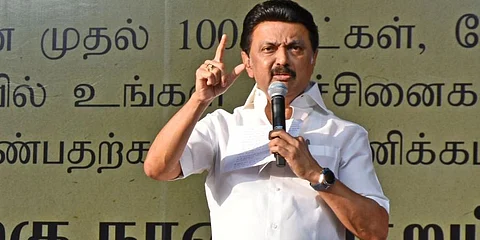

CHENNAI: A new law was enacted in the state assembly on Thursday reserving 7.5% seats to government school students in professional degree courses on a preferential basis. Higher education
officials said the reservations will be enforced in the college admissions this year itself. The streams covered are engineering, agriculture, veterinary, law, and other professional degrpee courses offered in government, government-aided, and private colleges in the State.
“Government students competing with private students are struggling to get higher education of their choice,” Chief Minister MK Stalin said in the assembly while introducing the bill. He attributed this to the socio-economic disparity as mostly students from disadvantaged backgrounds study in government schools. He said a mere 0.83% of the students admitted to Anna University last year were from government schools. It is 6.31% when it comes to government higher education institutions and 0.44% for government-aided engineering colleges.
Speaking to The New Indian Express, the higher education secretary, D Karthikeyan said, “As the bill was unanimously passed in the Assembly today, there is absolutely no hurdle in implementing it from this academic year."
According to higher education officials, the special reservation will benefit over 30,000 government school students. Only those who had studied from class 6 to class 12 in a government school in the state can avail of this benefit.
The previous AIADMK regime had last year similarly introduced 7.5% reservation for government school students in undergraduate medical admissions on the grounds that the students from disadvantaged backgrounds were finding it hard to score high marks in NEET. Now the DMK government has gone a step ahead and extended it to other professional courses.
M Sashidharan, a retired government college principal said, "Due to the 7.5% quota in medical admissions, last year over 400 students of government schools were able to study MBBS. The reservation exclusively for government school students will definitely boost the demand for government schools. And to cater to the rising demand we need to upgrade the infrastructure in government schools on a priority basis."
However, the move has not gone well with the private school as they feel it will reduce opportunities for their students and demoralise them.
“Along with a host of other reservations, now we have another quota for students studying in a government school. It is unfair as there is already cut-throat competition in all professional courses due to fewer seats,” said the principal of a Chennai-based private school, who wished not to be named.
The Bill was framed on the basis of the D Murugesan commission’s report, which was formed to assess and analyze reasons for less intake of government school students in engineering and other professional courses. The commission in its findings said the students being in a disadvantageous position, require more facilities to pursue their school education and preferential treatment in joining various professional courses. The commission had recommended that not less than 10% of seats in engineering, agriculture, veterinary, fisheries, law, and other professional courses may be set apart.
However, the government after analyzing different factors decided to implement a 7.5% quota for other professional courses.
The Bill stated the government decided to take affirmative action so as to bring about "real equality" between government school students and private school students by “setting apart a certain percentage of seats on the preferential basis".
“Though education is important to all students for their enrichment in knowledge and to lead a reasonable and meaningful life, the students from Government schools forming a distinct class require more attention of the State for preferential treatment in higher education compared to the students of private schools, who are provided with a better environment, different and conducive atmosphere in pursuing their education,” the Statement of Objects and Reasons of the Bill stated.